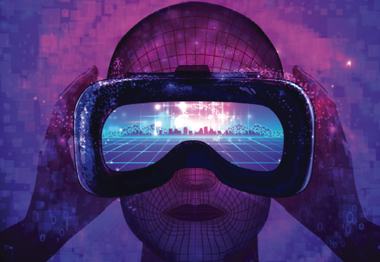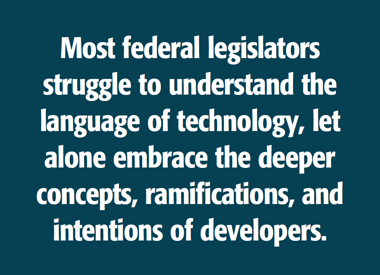Home / Data, Computing and Technology / News / Consequences of Technology
Consequences of Technology

By Nigel Atkin
Nigel is the founding member and a long-standing instructor of the Public Relations diploma program.
This article is featured in the 2023 spring and summer edition of The Scrivener. The Scrivener is the tri-annual magazine of the BC Notaries Association that publishes articles about points of law and the notary profession.

There are consequences to advancing communication technology. We can sometimes predict the effects that we call “progress.” Other times we cannot. Fortunately, some books help explain the changes we face.
When Marshall McLuhan wrote, Understanding Media: The Extensions of Man, in 1964, he titled the first chapter, “The Medium is the Message.”
Often misunderstood to mean the “content” of a message, he was studying how various new human-made technology was altering our world.
Many scholars today contend that McLuhan was “Canada’s most exciting and original thinker.” He is widely studied and considered relevant today.
In Understanding Media he explored and explained how the human inventions of print, the newspaper press, radio, television, weaponry, automation, etc., affected society in both predictable and unforeseen ways.
Since then, as we all know, there have been many technological, political, social, and cultural changes in our society.

For the most part, although we recognize that things have changed, we don’t fully understand how the technology has affected us, our families, and the wider cultures.
As we continue to witness technological advances and often benefit from them, we rarely ever fully recognize their downsides.
Even more rare is society’s ability to control or otherwise regulate technology’s newly unleashed power. Most federal legislators struggle to understand the language of technology, let alone embrace the deeper concepts, ramifications, and intentions of developers.
A brief history of social media
There have been many changes in communication media since McLuhan’s death in 1980—too many to document in the past 40 years. Here is a summary of some key moments in recent social media:
- 1997, Six Degrees—considered the first social media site launches
- 2001, Six Degrees closed
- 2002, Friendster launched
- 2002, Linkedin launches
- 2002, MySpace launches
- 2004, Facebook founded
- 2006, Twitter launched
- 2007, MySpace the most used in the world
- 2008, Facebook passes Myspace as most visited site in the world
- 2010, Instagram enters market
- 2011, Snapchat launched
- 2015, Friendster suspends service
- 2017, TikTok launches
In just a few recent decades, social media has gone from conceptual ideas to daily practice for some 5 billion users of social media in the world today. At the same time, the rate of change continues to accelerate, meaning “We ain’t seen nothing yet!”
Four laws of media
Eight years after McLuhan’s death, his son Eric and McLuhan Associates Ltd. published what was to become one of his most important theories, Laws of Media: The New Science (1988).
In that book, the McLuhans retrieved a new way of understanding the world based on previous thinkers from ancient Greeks to Francis Bacon, to T.S. Elliot and James Joyce in the previous century.
Media, in its broadest meaning, is explored in the book as “encompassing all that has been created by humans: Artifacts, information, ideas—every example of human innovation from a computer program to a teacup, from a musical arrangement to the formula for a cold remedy, from an X-ray machine to the sentence you're reading right now, all media to which can be applied the laws the McLuhans have developed.”
“The laws are based on a set of four questions—a tetrad—that can be applied to any artifact or idea.”
- What does it enhance or intensify?
- What does it render obsolete or displace?
- What does it retrieve that was previously obsolesced?
- What does it produce or become when pressed to an extreme?
For instance
- The car enhances transportation and privacy.
- It obsolesces the horse and buggy.
- It retrieves romance, the knight in shining armour.
- It reverses when pressed into an extreme traffic jam and gridlock.
Many thought-provoking ideas—even esoteric truths, some controversial—are applied in answering those four questions in the book.
As examples, the following thoughts are mostly quoted directly from the tetrads presented in 1988.
The Clock
Enhanced: Work
Obsolesced: Leisure, bells, and sundials
Retrieved: History as an art form cast in a fixed chronology
Reversed: The eternal present; the 17th century “Sacrament of the Present Moment”
Radio
Enhanced: Access to entire planet, everybody, everywhere
Obsolesced: Wires and connection and physical bodies
Retrieved: Tribal ecological environment, trauma, paranoia
Reversed: World Village Theatre
Wine
Enhanced: Food, the occasion
Obsolesced: Inhibition
Retrieved: Festive spontaneity of speech and gesture
Reversed: Hangover, insult
Airplane
Enhanced: Vertical and horizontal locomotion
Obsolesced: The wheel and the road
Retrieved: Aerial perspective
Reversed: Projectile
Stirrup
Enhanced: User’s weight and power
Obsolesced: Infantry
Retrieved: Centaur
Reversed: Tank
 Those are just a few of the “tetrads.” More important, today there are many more artifacts and ideas to think about and ponder to understand fully.
Those are just a few of the “tetrads.” More important, today there are many more artifacts and ideas to think about and ponder to understand fully.
While what the new product or idea advances, obsolesces, and retrieves from the past is straight forward, it is more difficult to understand what the new product will reverse into if taken too far, or used to an extreme.
Artificial Intelligence
The Four Laws of Media as presented by McLuhan can be powerful critical thinking tools to examine, surmise, and understand the role and consequences of new technology.
In online classes at the University of Victoria where I teach the Evolution of Public Relations, I ask students to learn how to use and answer the Four Laws of Media applied to many subjects.
Recently in class, their self-chosen exercises included questioning Netflix and Instagram, Yoga and Fashion, Marketing and “Voluntourism,” Twitter and Remote Online Learning, Free Speech and Empowerment. One post was a discussion about how fake news leads to fascism by smashing truth.
I asked student Jeremy Pilon to review and think about Artificial Intelligence from his and other views.
I summarize some of his thoughts below, all worthy of further examination from wider and otherwise inclusive perspectives.
Artificial Intelligence
Specifically, tools like ChatGPT that can produce and write copy and create imagery
Enhanced
All people’s ability to communicate clearly: Communication speed, clarity, and accuracy.
Obsolesced
Human writers, photographers and artists, word processors/art software, copyright and other intellectual rights, editors, and critics
Retrieved
Old voices and artists; pre-literate skills and behaviours whereby people may return to a time when manual and artisan skills become more desirable; class systems and slavery—our new machine intelligences become slaves or subservient to ourselves.
Reversed
Access to new original ideas. If taken to an extreme, no humans are creating novel ideas for AI to draw upon.
Demand for their output—if the AI ushers in a pre-literate world, there will be no people to consume the output, eliminating the need for AI.
He and others will be getting an “A” for their work in growing their understanding of consequences, the ebb and flow of technology, if not a tsunami of change.
While inventions enhance the technological landscape of our lives, the guidance, mores, and ethics, the general oversight and legislative aspects governing the controls of social media, etc., are yet to be implemented.
Privacy issues, legal issues such as copyright, academic integrity and technological governance are but a few of the discussions required in academic and governing institutions.
Nigel Atkin teaches the Evolution of Public Relations course online at UVic. He offers onsite workshops to leverage human capital and exploit the multiplier effect of becoming better communicators.

- Posted August 1, 2023
Visit Registration
2nd Floor | Continuing Studies Building University of Victoria Campus 3800 Finnerty Road | Victoria BC | CanadaTel 250-472-4747 | Email uvcsreg@uvic.ca
2026 © Continuing Studies at UVic
Legal Notices |
Sitemap

